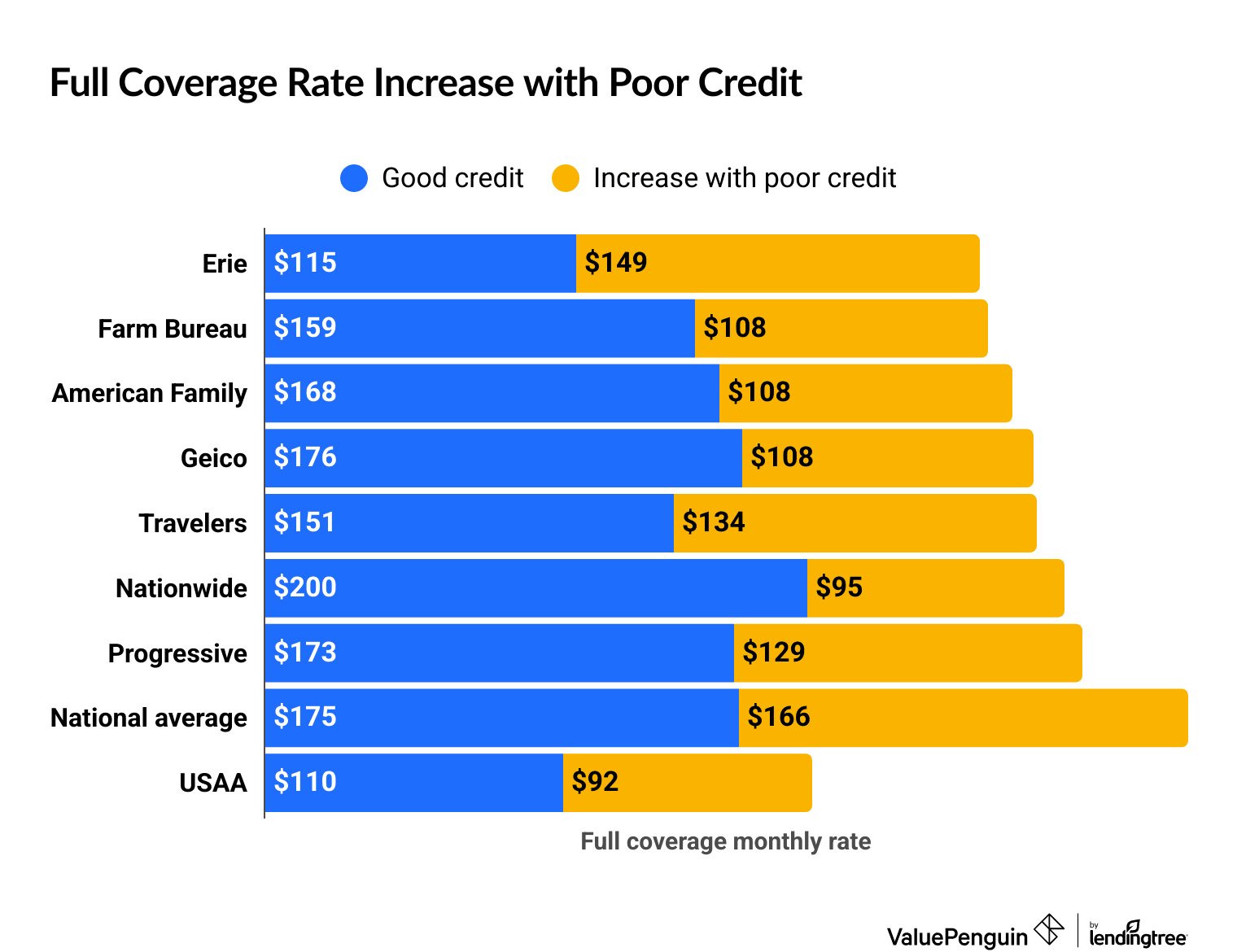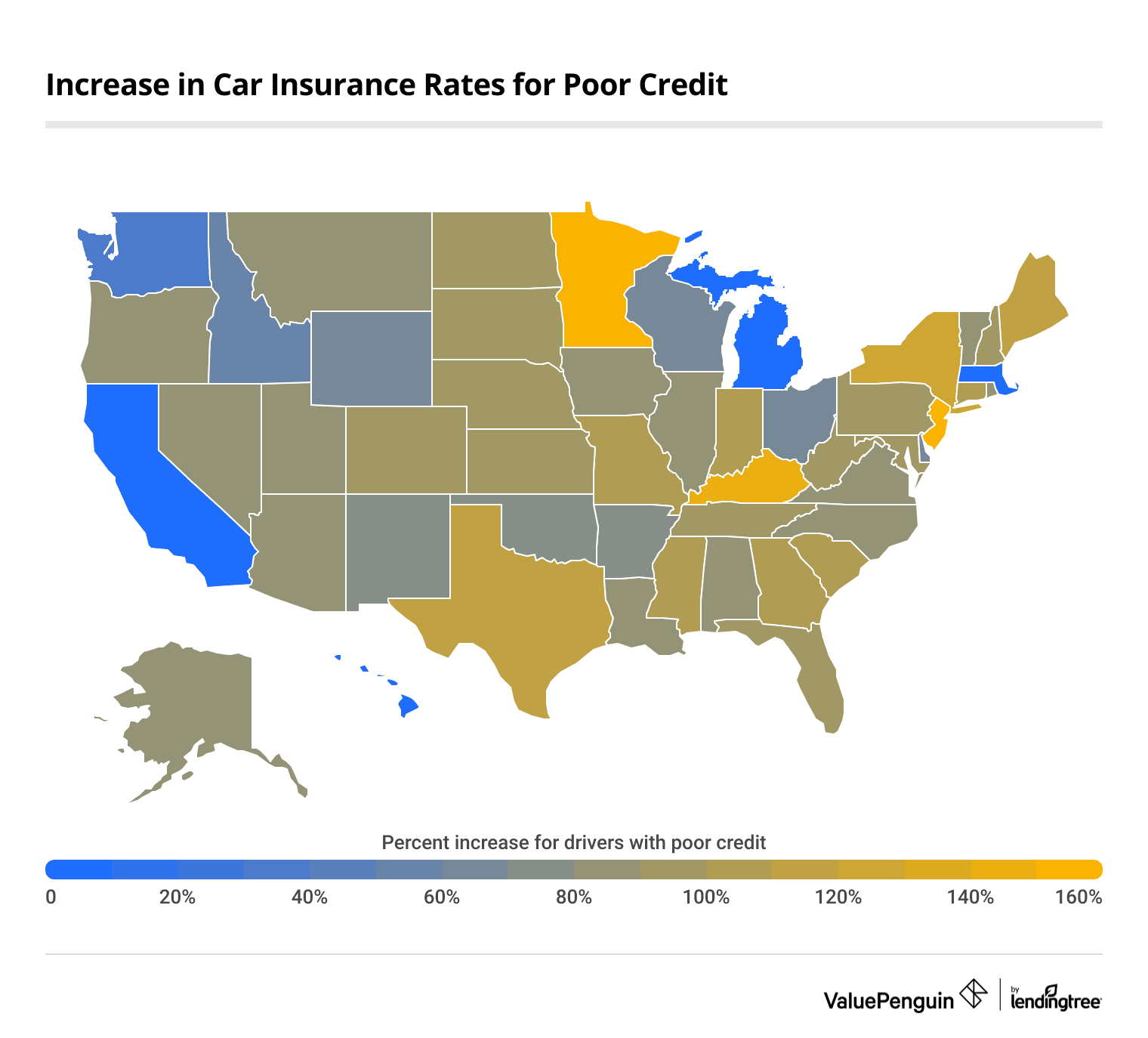How Does Your Credit Score Affect Auto Insurance Rates?
Poor credit raises rates by 95% compared to having good credit.
Your credit score can impact your car insurance rate. A higher credit score decreases your car insurance rate with almost every insurance company and in most states. Getting a quote, however, won't affect your credit.
Find Cheap Auto Insurance Quotes
How much does your credit rating affect insurance rates?
Drivers with poor credit pay $166 more per month for full coverage than those with good credit, on average.
Having a bad credit score can increase your rate by more than $400 per month, depending on which company you choose.

Find Cheap Auto Insurance Quotes
For example, Nationwide has the smallest increase in price for a driver with poor credit. A driver with poor credit pays just $95 more per month than one with good credit.
State Farm has the biggest price hike for bad credit, with drivers paying $406 more per month with a low credit score.
Bad credit car insurance rates in your state
Insurance companies don't all view your credit score the same way. Each company has slightly different ranges that they base car insurance rates on. So, a "good" score with one company may be considered "average" or even "poor" elsewhere.
How does credit affect car insurance rates?
Your credit score has a major effect on car insurance prices. The majority of insurance companies use credit scores as part of how they determine what you pay for coverage.
Insurance companies have consistently found that people with lower credit scores are more likely to file insurance claims.
Research by the Federal Trade Commission shows that this correlation holds true even if you control for things like race, income and where you live.
Still, insurance companies generally don't just look at the number on your credit score — they consider your full credit report to come up with your credit-based insurance score. .
A credit score is a number that estimates how safe it is for a company to lend you money. The higher your score, the more likely a bank thinks you are to pay back money you borrow.
It's based on five primary factors, in rank order:
- Payment history: How consistently you pay your bills
- Amount owed: How much debt you have, relative to your credit limit
- Length of credit history: How long you've had credit accounts, like credit cards or student loans
- Mix of credit types: The types of credit accounts you have open
- New credit: How often you apply for new credit cards or loans
You may also pay more for insurance if you don't have a credit history. This is often the same as having poor credit, from an insurance company's perspective.
Credit scores range from 300 to 850. Companies typically divide scores into several tiers.
Credit score tiers by FICO Scores
Tier | FICO Score |
|---|---|
| Excellent | 800-850 |
| Very good | 740-799 |
| Good | 670-739 |
| Fair | 580-669 |
| Poor | 300-579 |
How much your score affects your rates will be different depending on the state you live in.
Four states — California, Hawaii, Massachusetts and Michigan — ban companies from using your credit report to determine insurance rates. Instead, companies in these states base rates on your driving record, location and other characteristics.
Some states, including New Jersey and Rhode Island, don't allow companies to charge you more for a lack of credit history.
Worst states for drivers with bad credit
Poor credit raises rates the most for drivers in Washington, D.C., where bad credit drivers pay more than twice as much.
There are twelve other states where poor credit more than doubles your rates: Connecticut, Georgia, Indiana, Kentucky, Maine, Minnesota, Mississippi, Missouri, New Jersey, New York, South Carolina and Texas.

Find Cheap Auto Insurance Quotes
Among states that let credit affect your rate, Washington has the smallest increase in rates for drivers with poor credit, at 30%.
Monthly full coverage rates by state
State | Poor credit rate | Price increase |
|---|---|---|
| Alabama | $365 | 88.1% |
| Alaska | $261 | 85.1% |
| Arizona | $413 | 89.5% |
| Arkansas | $347 | 79.8% |
| California |
Do insurance companies check your credit?
Car insurance companies almost always check your credit when you buy a new policy.
Every major insurance company uses your credit history in some way, according to a report from the Federal Trade Commission.
Insurance companies check your credit because they believe drivers with poor credit tend to file more claims. Because these drivers will likely use their insurance more, they're more expensive for insurance companies to cover.
California, Hawaii, Massachusetts and Michigan don't allow insurance companies to use credit to determine car insurance rates.
Does getting a car insurance quote affect your credit score?
Getting a car insurance quote shouldn’t affect your credit score.
Car insurance companies do a "soft pull" when you get a quote, which doesn't influence your credit score. In contrast, a "hard pull" credit check impacts your credit score.
- Soft pulls only check some basic info and have no impact on your credit score.
- Hard pulls provide a full credit history and slightly lower your credit score for a short time. For example, if you apply for multiple credit cards in a short period of time, the buildup of hard pulls can lower your score.
Frequently asked questions
Which car insurance companies check your credit?
Every major car insurance company checks your credit before offering a binding quote. That includes Geico, State Farm, USAA, Progressive, Allstate and Liberty Mutual. Only a few insurance companies won't check your credit.
Does credit score affect car insurance rates?
Yes, a higher or lower credit score can have a big impact on your insurance rate. Poor credit increases full coverage rates by 95% compared to good credit.
Does getting insurance quotes affect credit?
No, getting an auto insurance quote won't affect your credit. Insurance companies check your credit with a soft pull. A soft pull doesn't provide a full credit history, nor does it impact your score.
Does car insurance affect my credit score?
Getting car insurance shouldn't affect your credit. However, if you miss payments, the insurance company might report that to credit agencies, which could ultimately impact your credit score.
Does changing car insurance affect credit score?
No, changing insurance companies or policies doesn't have any effect on your credit score.
Methodology
To determine how bad credit affects car insurance rates, ValuePenguin collected quotes from ZIP codes in all states that use credit scores as part of calculating insurance rates. Quotes are for a 30-year-old male driver with a 2016 Honda Civic EX and a clean driving record.
Rates are for a full coverage policy with higher liability limits than required in each state, along with comprehensive and collision coverage.
- Bodily injury liability: $50,000 per person; $100,000 per accident
- Property damage liability: $25,000 per accident
- Uninsured and underinsured motorist liability: $50,000 per person; $100,000 per accident
- Personal injury protection: Minimum required by state
- Comprehensive and collision coverage: $500 deductible
Insurance rate data came from publicly sourced insurance company filings collected by Quadrant Information Services. Quotes should be used only for comparative purposes only. Your own quotes will be different.
FTC report on credit-based insurance scoresEditorial Note: The content of this article is based on the author's opinions and recommendations alone. It has not been previewed, commissioned or otherwise endorsed by any of our network partners.
